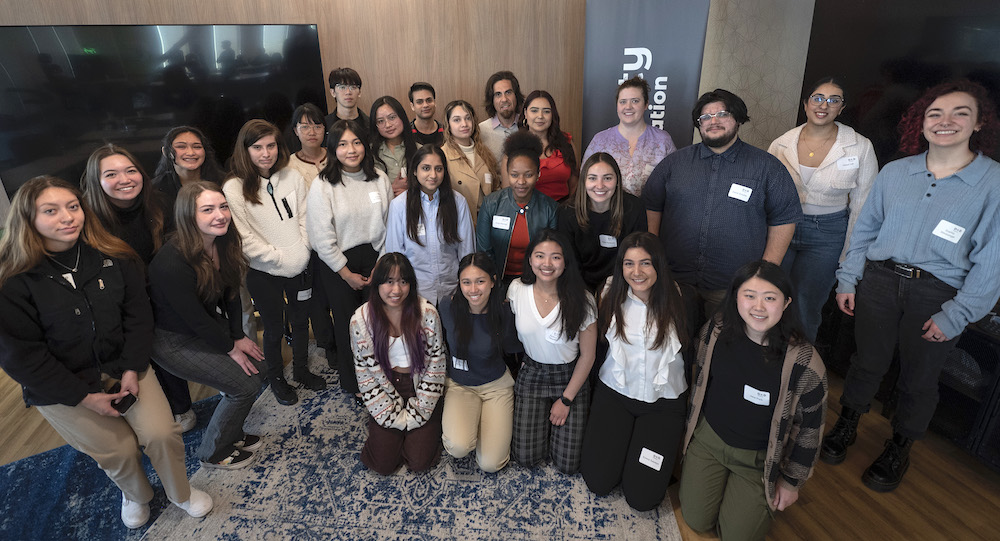Leading medical device companies join DxD HealthTech to diversify the medtech ecosystem
Diverse community college students across the Bay Area are invited to apply for the second annual Pathways in Health Technology program, where they will learn about the wide range of career opportunities available in the field of health technology. This immersive 8-week program is sponsored by Diversity by Doing HealthTech, along with its partners, Stanford Byers Center for Biodesign, Fogarty Innovation, and local medical device companies that are committed to supporting diversity in the industry.
“DxD HealthTech’s Pathways in Health Technology inaugural program was extremely well received by both students and companies, so we are excited to offer it again this year,” said Ingrid Ellerbe, executive director of DxD HealthTech. “Many community college students are not aware of all that the health technology industry entails. This program introduces them to the array of opportunities to contribute to health equity in diverse communities by using their unique skills and perspectives – whether they’re studying engineering, biology, or business.”
In April 2023, 26 students completed the inaugural Pathways in Health Technology program. 85 percent of the cohort were women and 42 percent were from groups historically underrepresented in STEM. The students hailed from 10 local community colleges: Cañada College, City College of San Francisco, College of Marin, College of San Mateo, De Anza College, Foothill College, Las Positas College, Los Medanos College, Merced College and Skyline College.
Following the program, several participants from the inaugural cohort landed summer internships in healthtech, including Karen Daniella Perdomo, a Cañada College student who interned at startup Zuno Medical.
“I refer to the DxD Pathways program as the start point of my career path,” said Perdomo. “Before my participation in the program, my knowledge of how an engineer contributes in the health industry was limited. But as soon as I got into it, I discovered engineering plays an important and significant role, which highly motivated me to dig more into the field, and look for an internship position.”
The hope is that graduates of the Pathways in Health Technology program can contribute to the future of health technology innovation, bringing diverse perspectives that help make medtech more equitable, accessible and trusted.
The 2024 Pathways in Health Technology program includes eight in-person meetings on weekends from January 20 until April 13, 2024, hosted at Stanford Biodesign on the Stanford University campus and Fogarty Innovation, which is located on the campus of El Camino Health in Mountain View, California. Students also meet in between sessions to collaborate and work on group projects.
Students who complete the program will receive a $1,000 grant, funded by the Advanced Medical Technology Association (AdvaMed).
DxD was launched jointly by Fogarty Innovation and Stanford Biodesign in 2020 following a study published in Annals of Biomedical Engineering that revealed numerous workplace inequalities in the health technology industry that negatively affect women. Respondents reported that they didn’t feel like part of the team at work and their ability to rise was hampered by a lack of access to the networks of power and influence that open the doors to leadership positions. The survey also found that mentoring made a difference in terms of job satisfaction and an inclusive environment. DxD concentrated on gender initially, but now focuses more broadly on racial equity and other dimensions of diversity with the goal of bringing more women and people of color into the health tech ecosystem and amplifying their voices.
DxD HealthTech is supported by Affiliate Members including XII Medical, Allay Therapeutics, Enspectra Health, Hyperfine, Imperative Care and Longitude Capital, Presidio Medical and Sonder Capital.
About Diversity by Doing (DxD) HealthTech
DxD is an industry-based collaborative that seeks to enhance diversity, equity, and inclusion in the health technology innovation ecosystem. In collaboration with its partners, DxD empowers diversity change agents in small- to mid-stage healthtech companies by providing education, expert voices, experiential programs and practical resources. DxD has built a suite of programs that address diversity across the pipeline, from early career programs like the summer seminar, to speed mentoring programs for early and mid-career individuals, to a free lecture series that helps companies operationalize DEIB in hiring, supply chain, and corporate culture. DxD was founded and is supported as a partnership between Fogarty Innovation and Stanford Byers Center for Biodesign. For more information, please visit diversitybydoing.org.
About Fogarty Innovation
Fogarty Innovation is a nonprofit educational incubator that works to advance human health by accelerating the invention, development and deployment of new medical technologies into clinical care. Led by a team of seasoned professionals, the organization helps young companies navigate the path to commercialization, delivers practical educational programming to stakeholders across the ecosystems, and forges stronger alliances among innovators, industry, and government. Founded by Thomas J. Fogarty, MD, a world-renowned cardiovascular surgeon, inventor, and entrepreneur, Fogarty Innovation is headquartered on the El Camino Health campus in Mountain View, California. Learn more at fogartyinnovation.org
About the Stanford Byers Center for Biodesign
Co-founded in 2001 at Stanford University by Paul Yock, MD and Josh Makower, MD, the Stanford Byers Center for Biodesign is committed to advancing health outcomes and equity through innovation education, translation, and policy. We believe that diversity across multiple dimensions inspires creativity and helps us innovate for all patient populations. To date, more than 9.4 million people have been helped by technologies initiated during Stanford Biodesign training programs, and the biodesign innovation process has been widely adopted by universities and training programs around the world. For more information, please visit biodesign.stanford.edu.

